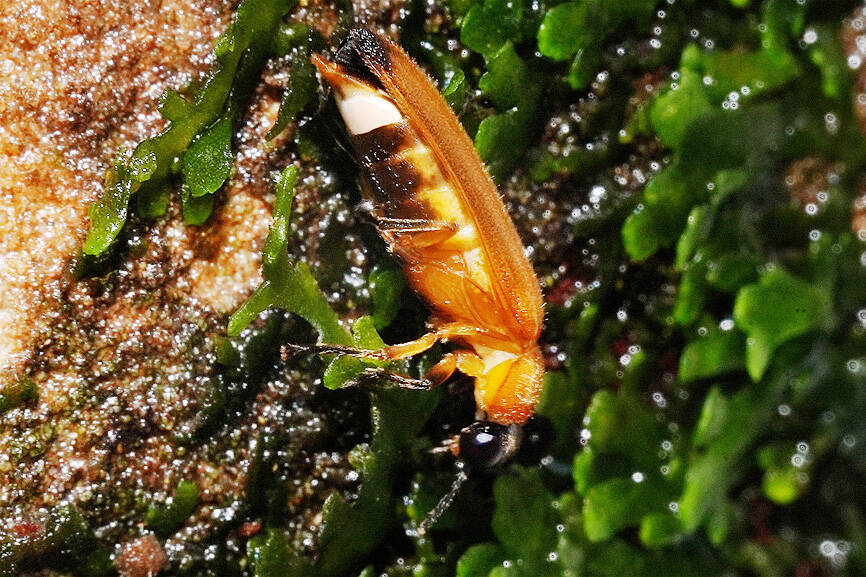A type of aquatic firefly discovered in Keelung has recently been confirmed to be a new species, the Wild Bird Society of Keelung said on Wednesday.
The new species was discovered while the society was working on a three-year project on firefly ecology and rehabilitation, which began in 2022 and was commissioned by the Keelung City Government, the society said in a statement.
It added that it first saw the fireflies in the mountains in Keelung’s Nuannuan District (暖暖) in the first year of the project, and with the help of firefly expert Chen Tsan-jung (陳燦榮) and National Museum of Natural Science Department of Biology chair Cheng Ming-lun (鄭明倫), they were confirmed to be part of a new species.

Photo courtesy of the Wild Bird Society of Keelung
The newly discovered fireflies fly at canopy height, and their larvae live and forage in water, meaning it is also an aquatic species — the fourth aquatic firefly species discovered in Taiwan, the society said.
The species has been temporarily named the “Beimiao” (北杪) firefly, relating to the fact it was discovered in northern Taiwan and flies at canopy height, the society said. Director of the society Shen Chin-feng (沈錦豐) said that the Aquatica hydrophila, a Taiwanese aquatic firefly, and the Pristolycus kanoi Nakane, the only semi-aquatic firefly species in Taiwan, are also present in Keelung.
He said that this, and the discovery of the new firefly species, shows that Keelung has a good natural habitat and clean water supply, particularly in Nuannuan and Qidu districts.
He added that in addition to the new species found in Nuannuan, during a survey conducted in five different parts of Keelung as part of the project, the highest number of fireflies were found in the Youruei (友蚋) area of Qidu District (七堵).

Taiwanese can file complaints with the Tourism Administration to report travel agencies if their activities caused termination of a person’s citizenship, Mainland Affairs Council Minister Chiu Chui-cheng (邱垂正) said yesterday, after a podcaster highlighted a case in which a person’s citizenship was canceled for receiving a single-use Chinese passport to enter Russia. The council is aware of incidents in which people who signed up through Chinese travel agencies for tours of Russia were told they could obtain Russian visas and fast-track border clearance, Chiu told reporters on the sidelines of an event in Taipei. However, the travel agencies actually applied

Japanese footwear brand Onitsuka Tiger today issued a public apology and said it has suspended an employee amid allegations that the staff member discriminated against a Vietnamese customer at its Taipei 101 store. Posting on the social media platform Threads yesterday, a user said that an employee at the store said that “those shoes are very expensive” when her friend, who is a migrant worker from Vietnam, asked for assistance. The employee then ignored her until she asked again, to which she replied: "We don't have a size 37." The post had amassed nearly 26,000 likes and 916 comments as of this

New measures aimed at making Taiwan more attractive to foreign professionals came into effect this month, the National Development Council said yesterday. Among the changes, international students at Taiwanese universities would be able to work in Taiwan without a work permit in the two years after they graduate, explainer materials provided by the council said. In addition, foreign nationals who graduated from one of the world’s top 200 universities within the past five years can also apply for a two-year open work permit. Previously, those graduates would have needed to apply for a work permit using point-based criteria or have a Taiwanese company

The Shilin District Prosecutors’ Office yesterday indicted two Taiwanese and issued a wanted notice for Pete Liu (劉作虎), founder of Shenzhen-based smartphone manufacturer OnePlus Technology Co (萬普拉斯科技), for allegedly contravening the Act Governing Relations Between the People of the Taiwan Area and the Mainland Area (臺灣地區與大陸地區人民關係條例) by poaching 70 engineers in Taiwan. Liu allegedly traveled to Taiwan at the end of 2014 and met with a Taiwanese man surnamed Lin (林) to discuss establishing a mobile software research and development (R&D) team in Taiwan, prosecutors said. Without approval from the government, Lin, following Liu’s instructions, recruited more than 70 software